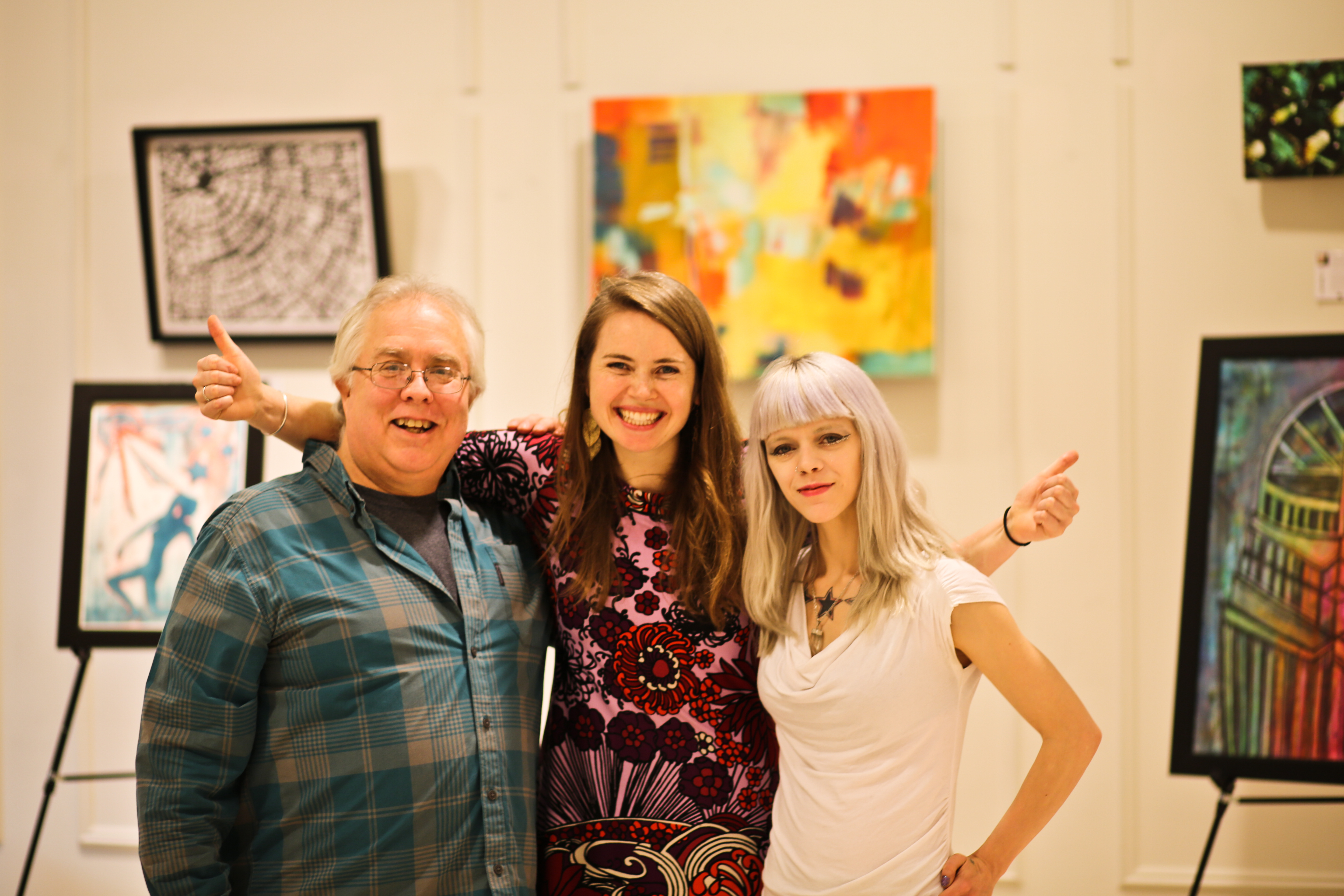ArtLifting Helps Homeless Artists Sell Their Work

Artist Scott Benner, ArtLifting cofounder Liz Powers, and artist Kitty Zen. / Photo courtesy of BCAE
Looking back, Scott Benner never realized how quickly becoming homeless could be. In 2009 when he lost his job running a crane, developed Horner’s syndrome, and his wife was undergoing chemotherapy, Benner soon found himself selling his home and unable to afford a new one. He says he “saw the end coming.”
After ending up in Father Bill’s Place in Quincy, Benner picked up a pen and some copy paper during one of his library visits and returned to his lifelong pastime of drawing. He channeled his inspiration M.C. Escher, growing his portfolio of mind-twisting black-and-white designs.
After sharing his creations with friends at the shelter, Benner heard of an organization that showcased homeless artists’ work. After getting his feet back underneath him, Benner discovered ArtLifting, an organization that helps homeless artists sell their work, and arranged an interview with the company’s cofounder Liz Powers.
When Benner first met Liz, she gave him a hug. Having never displayed his art publicly before, he let a total stranger walk away with his life’s work, with some pieces dating back to the early 1970s, simply because he sensed it was in good hands.
“From that point on I really felt like I had a light at the end of the tunnel with my whole homeless situation,” Benner says. “I was part of something good and it was going on, and I realized that I had some earning potential with my artwork.”
ArtLifting’s objective is to do what it’s done for Benner on a large scale. The public benefit corporation aims to help homeless and disabled artists earn an income by selling their own original artwork, prints, and products.
The name fuses the words “art” and “uplifting”—encompassing both the company’s products and its mission to raise the confidence and power of artists.
ArtLifting sells its products online, where customers can browse options by artist and product type—they sell everything from original paintings to phone cases to full collections. The online gallery offers a range of artistic styles, from intricate paper-cut masterpieces to abstract Pollock-esque paintings to impressionist renditions of Copley Plaza.
Ten years ago, as an 18-year-old Harvard undergrad, Powers embarked on the path that would lead her to founding ArtLifting. She began volunteering at Harvard Square Homeless Shelter, and a year later, she started doing casework, working to help homeless people secure housing, jobs, and long-term access to food resources.
“During those four years, I met with so many clients one-on-one, and one thing that I kept hearing over and over was, ‘I’m incredibly lonely,’” Powers says.
Powers realized a simple way to solve loneliness: bring people together. At age 22, she formed art groups in Central Square using the public service fellowship Harvard awarded her upon graduation, and she and her brother Spencer put their heads together to spark the idea of ArtLifting after he volunteered at her annual art show for homeless and disabled artists in Boston.
As they brainstormed, they realized this entrepreneurial pursuit had economic potential, too—the supply and demand were there. Valuable artwork was being left behind in the basements and closets of shelters, while customers were looking to purchase local art in every city.
The power of ArtLifting soon revealed itself. While together the Powers siblings invested only $4,000 to start the business, their revenue ultimately came out in the six figures. And soon after they got started, five of their artists gained housing, not only as a result of increased income, but also from the confidence boost of realizing their talents.
“After the last decade of working with homeless individuals, I’ve heard over and over, ‘Liz, I don’t want another handout. I don’t want someone to hand me another sandwich. I just want opportunity. I want an ability to change my own life.’ And that’s really gotten to me,” Powers says.
This goal of empowering artists and treating them with dignity is one of the reasons the Powers decided to make ArtLifting a for-profit social enterprise. To achieve this, ArtLifting emulates the business standards of a “normal” gallery, which typically splits profits fifty-fifty with artists. ArtLifting gives 55 percent of proceeds to the artists, 1 percent to an art supply fund for a shelter they work with, and invests the remaining 44 percent back into growing the company.
Since its founding in 2013, ArtLifting has expanded from four artists to 72 and from only Boston to 10 more cities. Its latest artist location? Los Angeles. ArtLifting has partnered with the Cerebral Palsy organization there, working with artists who have adapted to their disabilities to create art—they have artists who paint using a brush attached to their heads, and an artist who paints using a canvas underneath his wheelchair.
Continuing to increase opportunities for their artists, this past Memorial Day, four of ArtLifting’s local artists’ work were on display at the Museum of Fine Arts. This was the second time their artists have had work displayed at the museum.
Since getting involved in ArtLifting, Benner’s work has been showcased on Newbury Street and in SoHo, and he was able to leave the shelter after being put on disability in November. Now, in terms of making his living, Benner says ArtLifting is close to surpassing his social security.
“With all the other artists, it’s a running joke now,” Benner says. “We say when the phone rings and it’s Liz, that usually means something good is about to happen.”
Powers will host a seminar at the Boston Center for Adult Education next week. Register online or by phone. $43 for members, $50 for nonmembers, Monday, June 13, 6:30-8:30 p.m., BCAE, 122 Arlington St., Boston, 617-267-4430, bcae.org.


